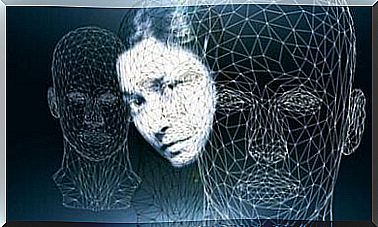Delusion Of Persecution: Cognitive Factors Involved

In a context of schizophrenia, delusional disorder and brief psychotic disorder, delusion can be of different types: guilt, grandeur, control or persecution, among others. In this article, we will focus on the cognitive factors involved in the delusion of persecution.
Although they are often associated with insanity and the fact that they cannot be fully explained, in reality this is not the case at all. Some cognitive factors involved in the development and maintenance of the delusion of persecution are well known.
Delirium falls within the broad spectrum of symptoms found in schizophrenia or brief psychotic disorder. In the case of delusional disorder, however, it is the main symptom.
Delusions are not signs of insanity: in fact, they are by no means alien to mentally healthy people. This also holds a hope: the modification of certain cognitive models could lead to the disappearance of the delusion. We talk about it in detail in the next few lines.

Delusion of persecution: what is it?
Delusion can be considered as a set of erroneous beliefs or misinterpretations related to perceptions or experiences.
Such ideas are not abandoned even in the presence of sufficient evidence to demonstrate their unsustainability or unsubstantiation. This aspect complicates the action of intervention in disorders such as schizophrenia, when it is accompanied by delusions.
Some individuals are convinced that certain events, details or phrases are exclusively related to them and contain special meanings – delusions of reference.
Others are convinced that they are sick or that their body is changing, that their face is taking a square shape or that one leg is lengthening – somatic delusions ; still others believe they are being persecuted – delusions of persecution.
The delusion of persecution – the theme of this article – refers to a subject’s strong belief that he is at the center of a conspiracy.
He thinks he is being bullied, has his phone under control, or someone is rummaging through his things. In addition, it tends to view some people – including family and friends – as active parties in the conspiracy.
An example
The subject begins to manifest this type of delusion, and soon becomes convinced that family members are plotting against him to steal his home or to kill him.
By talking to a family member and presenting alleged evidence in their possession, they may try to convince them that this is not the case, by showing them evidence that contradicts their beliefs or by refusing to believe what they say.
At this point, in his eyes that familiar ends up becoming part of the conspiracy. All this favors social isolation and the deterioration of family relationships.
The pattern can also be repeated for the therapist. In fact, by denying his delusions, the therapist himself can become part of the “persecutors”. For this reason, the psychological treatment of delusional persecution represents a real challenge.
Cognitive factors involved in the delusion of persecution
Several researches and studies have established that people with persecution delirium have several common cognitive factors.
The latter reinforce the delusion and explain in part why any attempt to question it falls on deaf ears, or why the subject continues to find evidence to support his conspiracy hypothesis.
Attentional and memory bias
Attentional biases are present in large numbers. For the subject, all those events that confirm his delirium become particularly relevant. The same happens in patients with social phobias or social anxiety.
In fact, they tend to avoid looking at the interlocutor’s eyes and mouth – traits that most characterize facial expressions – in order not to feel threatened.
As a result of this bias, they more easily remember threatening information, meaning they remember angry faces much more vividly than cheerful ones.
All of this translates into a greater sensitivity to social punishment. They see others as a threat. In their daily lives, they encounter a greater number of angry and angry friends or acquaintances.
In addition to attentional bias, this is due to the fact that they tend to interpret each message in this sense, thinking that the other is angry, when they probably are not.
Information processing process
Ideas generation processes different from those of the general population have been found in people with persecution disorder.
Biases are observed that lead the subject to collect information differently from others, confirming their basic idea: being persecuted. Some of these factors are:
- Probabilistic reasoning : these are people who jump to conclusions very quickly, without thinking and making use of “probability”.
This means that they need less information than the average person to make a decision, and they are sure they are right. The problem arises when probabilistic reasoning applies to emotional material.
- Covariation Bias : Similarly, they create quick associations between events. They formulate incorrect associations between situations or events that are not necessarily related.
- Self-referential bias: they perceive themselves as the protagonist of a film or a drama. Everything is about them – people’s attitudes, comments, conversations.
Secondly, the defensive or aggressive attitude of the person suffering from delirium leads them to not be well received. Treatment that would represent further evidence in support of his idea.
Causal attribution: what is my fault and what is your fault?
Within the cognitive factors we find another bias: internalizing and externalizing. Starting from it, the causal attributions of the events are processed, so that all negative events are attributable to the others; because others are dangerous, and therefore bad things depend on them.
This produces two results: it feeds delirium, as it confirms that the “others” are bad and do bad things; and avoids guilt. This is adaptive bias that reduces the discomfort caused by the delusion itself.
On the other hand, these people often tend to give out of the ordinary explanations about everything that happens to them – physical, mental and emotional experiences. They attribute their difficulties in daily life to implausible causes: they spy on me, they bombard me with electromagnetic waves to give me a headache.
Finally, they often manifest somatic sensations, such as anxiety, headache or itching, which they often interpret as indicators of malicious action against them.

Delusion of persecution: ideas of justice and goodness as part of the problem
Finally, within the cognitive factors involved in the delusion of persecution, we find some very particular ideas about life: is life fairer with me or with others?
People with depression tend to think that life is equally right. The general population tends to think it is a little fairer to themselves.
While for people with delirium of persecution it is exactly the opposite: they think that life is particularly unfair towards them.
The deepest beliefs of these people about justice, goodness, the worth of humanity are different. The idea that others are treated better not only undermines their self-esteem, it is also what defines and filters all other thoughts and cognitive processes.
Every emotion, thought or action is tainted with the idea that the world is unfair and that nobody can be trusted. An aspect that can lead the individual to nourish feelings of inferiority, compromising his own self-concept, and leading him to try to feel better through “adaptive” mechanisms: the persecutory belief that nothing of what happens is his fault.
Conclusions
The conclusion that can be reached is that often, in the case of delusional disorders, we focus more on the content of the delusion than on the cognitive factors that favored it.
We simply think that these people are “crazy”, while developing a delusion of persecution can make perfect sense, can be explained, and then treated.








